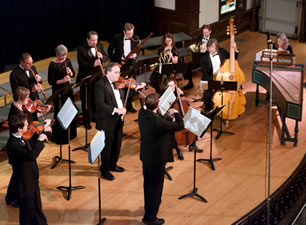Each year about this time, the Raleigh Symphony Orchestra features two soloists who have won a competition among high school students from around the state. This is my favorite of all the types of concerts RSO gives, and exemplifies the great service to our cultural community that this orchestra offers on a consistent basis. Young musicians of such high caliber need experience with large ensembles, and audiences need to witness the extraordinary skills that such young people have acquired. There is no substitute for actual performances, no matter how advanced our digital culture has become.
This afternoon’s concert started with W. A. Mozart’s Symphony No. 31, K. 297, composed at age 22 while on a frustrating job search in Paris. This is an unusual symphony in a few ways. It is only three movements, omitting the usual minuet of the period. In addition, Mozart wrote the work specifically for an extraordinarily large orchestra – the largest he ever worked with. This resulted in orchestration with winds and brass in pairs, including clarinet for the first time in his symphonic works. The performance he got out of his orchestra at the time was poor due to having only one rehearsal. Thus, it ever has been with new music, evidently.
This work has some challenging passages, as there are fast notes in the second violins in the last movement. Conductor Jim Waddelow took the last movement at a relatively moderate tempo, which was merciful on the players; I remember playing this back in my college days, and having to sweat to get it up to the tempo we used. One note I must include as a critic: the RSO has some balance problems, as the first violins dominate in volume. In this symphony, there are important inner voices in the strings and several wind passages that were not brought out enough, especially the fast notes for the second violins in the final movement.
Next came the first movement of Antonín Dvořák’s great Concerto for Cello, Op. 104. This standard work for cello is a milestone in the literature and a must-play for cellists everywhere, if they can manage the technical challenges. Our soloist this afternoon was Shinae Ra, 17 years old, from Fayetteville NC. She studies with Emanuel Gruber at ECU, who was in attendance (and quite the proud teacher, I must say). She has had some success at a series of competitions, and we saw why in this performance. Her intonation was very good, and had a fine sense of musical line. I think it would be a very good idea for her to get a cello with a different tone, if she wants to do solo work; this instrument is a bit bright and thin. Of course, fine cellos are quite expensive!
Ra certainly will be able to have a career in music if she sticks with it, and from my brief chat with her afterwards, that appears to be her plans. Keep an eye out for this musician in years to come.
This was followed by Tchaikovsky’s Romeo And Juliet Overture-Fantasy, a work that is always fun to play and very typical of the composer. The music was originally an early work, but was revised three times, finalized some ten years after the first efforts. The final re-write tacked on the current big loud ending, which seems a very odd way to go after the music has dwindled to a soft level; but I have heard that publishers demanded a loud ending, and so the composer complied. The love theme from this overture has been used many times in television and movies, and even video games, and verges on the kitsch. Here it was tastefully done. Again, there were some balance problems, especially in the winds during exposed passages.
To end the program, we had soloist Florence Liu, 15 years old, performing the first movement of Rachmaninoff’s Piano Concerto No. 2, Op. 18. Liu was clearly shy and a bit overwhelmed by the event, but as you might imagine, it is entirely unfair to fault a young person’s first big concert for reasons of inexperience! Once she started playing, she demonstrated a good mastery of this difficult piece. True, there was a little rushing from time to time, but overall she did a wonderful job. With experience will come the refinements, such as performing with the last row of the auditorium in mind – not so easy to do if you are accustomed to playing in small recital rooms. But given the great talent shown here, these details will not be difficult for such a bright teenager.
Congratulations to the two soloists, and many best wishes for the careers they so richly deserve.












